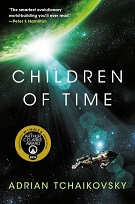Review of 'Children of Time'
Children of Time by Adrian Tchaikovsky
 A small artificial satellite orbiting a remote planet protects an experiment involving an infection of a nano-virus accelerating the development of the species inhabiting the planet and in doing so, hopefully, make the planet suitable for settlement by mankind. Unfortunately the experiment has gone a bit sideways and instead of infecting an introduced population of monkeys it has instead accelerated the development of a spider-based race that quickly conquers “Kern's World”. On Earth the civilisation that built the satellite has vanished and the planet is dying, leaving a much diminished race that lives by scavenging the technology that came before it. The Gilgamesh has left the solar system containing what remains of humanity to seek out the terraformed planets from the Old Empire but as the inhabitants threaten to tear each other apart and the ship itself suffers from the years of wandering, a planet inhabited by super-intelligent spiders looks very appealing…
A small artificial satellite orbiting a remote planet protects an experiment involving an infection of a nano-virus accelerating the development of the species inhabiting the planet and in doing so, hopefully, make the planet suitable for settlement by mankind. Unfortunately the experiment has gone a bit sideways and instead of infecting an introduced population of monkeys it has instead accelerated the development of a spider-based race that quickly conquers “Kern's World”. On Earth the civilisation that built the satellite has vanished and the planet is dying, leaving a much diminished race that lives by scavenging the technology that came before it. The Gilgamesh has left the solar system containing what remains of humanity to seek out the terraformed planets from the Old Empire but as the inhabitants threaten to tear each other apart and the ship itself suffers from the years of wandering, a planet inhabited by super-intelligent spiders looks very appealing…
An imaginative first SF offering from Tchaikovsky that really engages. We follow several key players on their multi-millennial journeys in chapters alternating between “Kern's World” and the Gilgamesh showing how they change over the years and adapt to their changing situations. On the planet we see the spiders raising themselves up from scattered small groups to working with the ant population to build a thriving society that struggles to come to terms with their ancestry and move to a more enlightened level. On the Gilgamesh we see the opposite, a highly ordered society declining into chaos and bloodshed while their world crumbles around them. It is the eventual clash of the two that, of course, is the culmination of the novel.
“Children of Time” is full of engaging characters and situations that utterly convince the reader. Tchaikovsky fully fleshes out the fantastic but at the same time bringing the reader into the picture without being patronising or overly complex. The concepts are clearly explained and lived through the eyes of his wonderful characters. There are scenes of wonder but others of brutality that ground the book in, well, our reality so it never feels too “out there”. The story starts slow, dragging in the middle but finally accelerates to a dramatic conclusion.
A great first SF model from a talented writer, winning the “Authur C. Clarke Award” (for SF) in 2016. Will be picking up more of his work in the future…
Rating: “I have absolutely no complaints”
Review Date: 2020-11-14
Genre: Science Fiction
Publisher: Pan
Publication Date: 2015
ISBN: 9781447273301